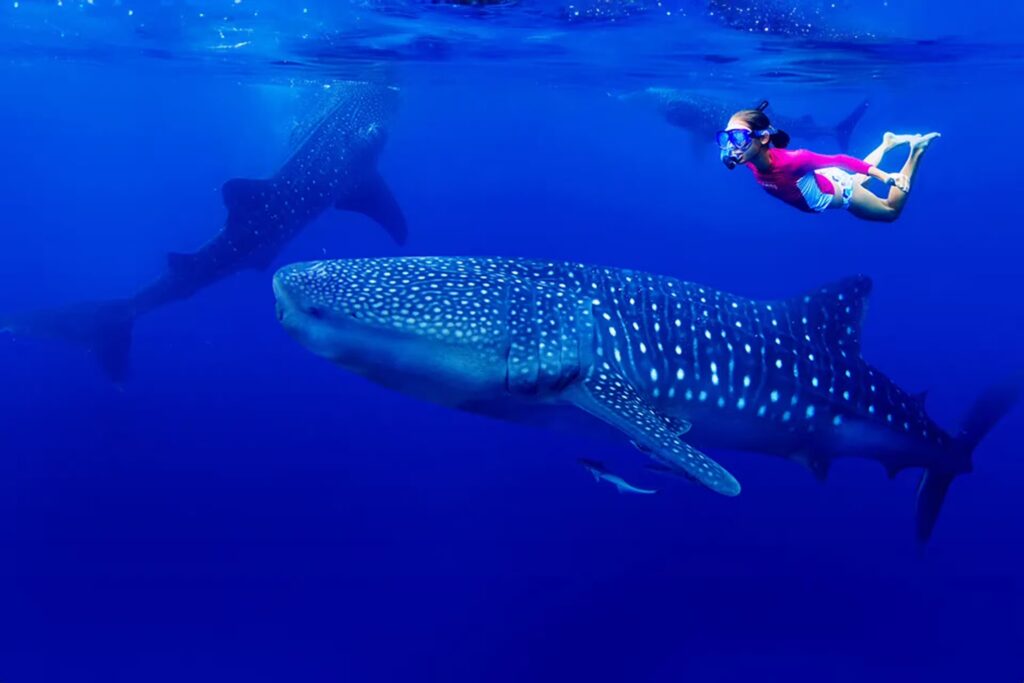In a world increasingly aware of the environmental impact of tourism, travelers are searching for more responsible and meaningful experiences. Among the most sought-after wildlife encounters is the chance to swim with whale sharks, the gentle giants of the sea. But not all whale shark experiences are created equal. While some destinations have been criticized for unethical practices, a new model is emerging—one grounded in respect, sustainability, and local empowerment.
One of the best examples of this new model is the Sumbawa whale shark ethical tourism movement in Indonesia. Tucked between the better-known islands of Lombok and Flores, Sumbawa offers not just close encounters with whale sharks, but a chance to participate in a tourism model that puts conservation and community first.
Why Whale Shark Encounters Matter
Whale sharks (Rhincodon typus) are the largest fish in the ocean, growing up to 18 meters long and weighing more than 20 tons. Despite their size, these creatures are harmless to humans, feeding exclusively on plankton and small fish. Their docile nature and majestic movements have made them a favorite among divers and snorkelers around the world.
But with popularity comes pressure. In destinations like Oslob in the Philippines or parts of Thailand, concerns have been raised about whale shark feeding, overcrowding, and environmental degradation. These practices not only alter the natural behavior of whale sharks but also threaten the health of local ecosystems.
This is where Sumbawa whale shark ethical tourism stands out.
What Makes Sumbawa’s Approach Ethical?
Sumbawa’s ethical approach to whale shark tourism is built on several key principles that prioritize animal welfare, ecological sustainability, and local community involvement.
1. No Artificial Feeding
One of the most damaging practices in whale shark tourism is artificial feeding. It disrupts migratory patterns and encourages unnatural behavior. In Sumbawa, whale sharks are not baited or lured. Instead, they are drawn to traditional bagan (floating fishing platforms), where lights and small fish naturally attract them at night.
This organic interaction means whale sharks remain wild and behave according to their natural instincts. Visitors observe these incredible animals as they truly are—not as performers, but as wild creatures in their own habitat.
2. Small-Scale, Low-Impact Tourism
Unlike commercialized destinations that pack dozens of tourists into the water at once, Sumbawa whale shark ethical tours are deliberately small. Most tours limit the number of snorkelers per trip, ensuring that encounters are calm, quiet, and respectful.
Operators also time their visits to avoid stressing the animals, and tours typically take place early in the morning, when whale sharks are most active and least disturbed.
3. Local Fishermen as Guardians
Perhaps the most unique and inspiring aspect of ethical whale shark tourism in Sumbawa is the partnership with local fishing communities. Traditionally, Sumbawanese fishermen used bagan to catch anchovies and other small fish. Over time, they noticed that whale sharks would often appear near their platforms.
Rather than seeing them as a nuisance, fishermen began working with tour operators and conservationists to protect these animals. Today, many Saleh Bay whale shark tours are co-managed by locals, who act as spotters, guides, and educators.
This partnership creates a direct economic benefit for coastal communities, encouraging long-term stewardship of the ocean.
4. Strict Environmental Guidelines
Operators in the Sumbawa whale shark ethical space follow strict codes of conduct, including:
- No touching, chasing, or riding the whale sharks
- Minimum distance rules (usually 3–4 meters)
- No flash photography
- Mandatory use of reef-safe sunscreen
- Time limits for each group in the water
- Mandatory briefings before each trip
These rules help minimize stress on the animals and preserve the quality of the experience for future generations.
Where to Experience Ethical Whale Shark Encounters in Sumbawa
The best place to join an ethical whale shark tour in Sumbawa is Saleh Bay (Teluk Saleh). This vast, sheltered bay in northern Sumbawa is known for its biodiversity and calm waters. Whale sharks are often spotted here near bagan, especially between April and October, when sea conditions are best.
Villages like Labuan Jambu, Kilo, and Dompu are common departure points for whale shark tours. Most operators provide:
- Snorkeling gear
- Safety briefings
- Trained guides
- Boat transfers
- Light meals or refreshments
Some also offer community-based homestay packages, giving you a chance to stay with local families and learn about traditional life in Sumbawa.
How to Get to Sumbawa
Getting to Sumbawa is part of the adventure—and well worth it for those seeking authentic experiences. Here’s how to get there:
- Fly to Lombok or Bali
- Take a domestic flight to either Sumbawa Besar (SWQ) or Bima (BMU)
- From there, travel overland to your tour’s departure point (usually 1–3 hours by car)
Most ethical tour operators can assist with transport and logistics, including airport pickup and accommodation booking.
What to Pack for an Ethical Whale Shark Tour
To fully enjoy your experience, bring:
- Snorkel gear (if you prefer your own)
- Lightweight swimwear and rash guard
- Reef-safe sunscreen
- Waterproof camera or GoPro
- Dry bag for valuables
- Hat, sunglasses, and flip-flops
- Motion sickness pills (optional)
Supporting Ethical Travel: Why It Matters
Choosing a Sumbawa whale shark ethical tour does more than offer a great travel story—it actively supports marine conservation, local livelihoods, and a better model of tourism. By spending your money with responsible operators, you:
- Reduce pressure on fragile ecosystems
- Encourage respectful animal encounters
- Help preserve the cultural heritage of coastal communities
- Set a new standard for sustainable adventure travel
Travel is not just about where you go, but how you go. And in Sumbawa, you have the opportunity to make your journey truly meaningful.
Other Ethical Activities to Explore in Sumbawa
While whale sharks may be the highlight, Sumbawa offers many other eco-conscious adventures:
- Trekking Mount Tambora – Discover the site of one of the largest volcanic eruptions in history.
- Visiting Moyo Island – Explore marine reserves, waterfalls, and untouched beaches.
- Surfing in Lakey Peak – Ride the waves in one of Indonesia’s most consistent surf breaks.
- Exploring traditional villages – Learn local weaving, wood carving, and traditional cooking methods.
Combining your ethical whale shark tour with these experiences creates a deeper connection with the island and its people.
Why Sumbawa Leads the Way in Ethical Wildlife Tourism
The world is changing—and so is the way we travel. No longer is it enough to simply chase the next Instagrammable destination. Today’s conscious travelers want experiences that align with their values, protect the planet, and uplift the communities they visit.
The Sumbawa whale shark ethical movement is proof that such travel is not only possible—it’s powerful. It offers a blueprint for how wildlife tourism can be conducted with integrity, care, and purpose.
So if you’re planning a trip to Indonesia and want more than just beautiful beaches, take the road less traveled. Swim with the whale sharks of Sumbawa—not just for the thrill, but for the future they represent.
Because the most unforgettable travel experiences are the ones that do good.

